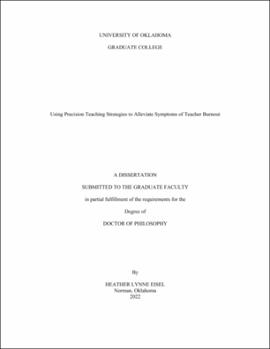| dc.contributor.advisor | Williams-Diehm, Kendra | |
| dc.contributor.author | Eisel, Heather | |
| dc.date.accessioned | 2022-08-12T19:56:44Z | |
| dc.date.available | 2022-08-12T19:56:44Z | |
| dc.date.issued | 2022 | |
| dc.identifier.uri | https://hdl.handle.net/11244/336462 | |
| dc.description.abstract | Teachers in the United States experienced a dramatic increase in occupational burnout following changes in instruction brought about by the COVID-19 pandemic. Teacher burnout, however, is not a new phenomenon. Burnout is the main cause of teacher absenteeism and turnover; the United States spends approximately $7 billion per year on teacher attrition. In the 2020-2021 school year, teachers cited stress as the primary reason for leaving the profession. Specifically, increased work demands, parent communication, and lack of administrative support were contributing factors to their symptoms of burnout. This study employed two methodologies, a single-case changing criterion design and a behavior dynamics design to evaluate the effects a precision teaching and self-management intervention package had on symptoms of occupational burnout in four special education teachers. Participants used wrist counters to track daily positive and negative thoughts and feelings for 6 weeks. Baseline included self-monitoring; the intervention was a 1-minute timing and self-management treatment package. Data were charted on standard celeration charts and analyzed using traditional precision teaching metrics. Results were mixed, with three participants showing small improvements and one showing slightly worsening outcomes. Pre and post burnout scores on the Maslach Burnout Inventory (MBI) showed improvements for three participants in some domains of the MBI. The Areas of Worklife Survey (AWS) showed improvement for three participants in several domains of the AWS. The social validity survey and qualitative data indicated that, in general, participants felt the study had a positive impact on their lives. One participant reported continued use of the 1-minute timing seven weeks after completion of the study.
Keywords: teacher burnout, precision teaching, standard celeration chart, private events, inner behavior, self-management, behavior dynamics | en_US |
| dc.language | en_US | en_US |
| dc.subject | Psychology, Behavioral. | en_US |
| dc.subject | Education, Special. | en_US |
| dc.subject | Education, Teacher Training. | en_US |
| dc.subject | Health Sciences, Occupational Health and Safety. | en_US |
| dc.title | Using Precision Teaching Strategies to Alleviate Symptoms of Teacher Burnout | en_US |
| dc.contributor.committeeMember | Sinclair, Tracy | |
| dc.contributor.committeeMember | Mayeux, Lara | |
| dc.contributor.committeeMember | Crowson, Mike | |
| dc.contributor.committeeMember | Peltier, Corey | |
| dc.date.manuscript | 2022-07-22 | |
| dc.thesis.degree | Ph.D. | en_US |
| ou.group | Jeannine Rainbolt College of Education::Department of Educational Psychology | en_US |
| shareok.orcid | 0000-0003-0602-5076 | en_US |
